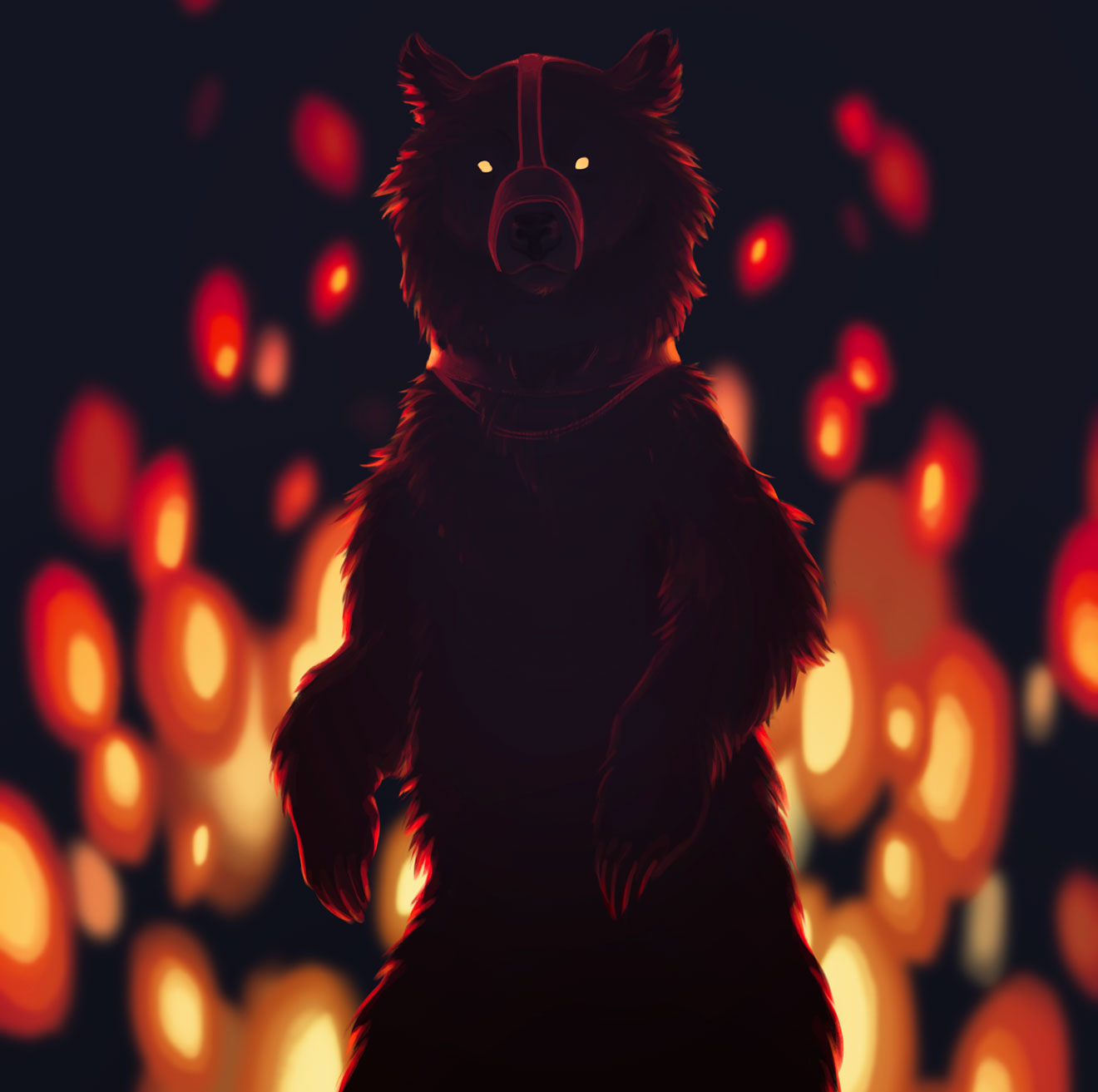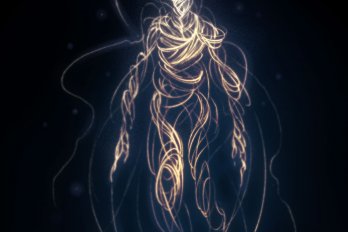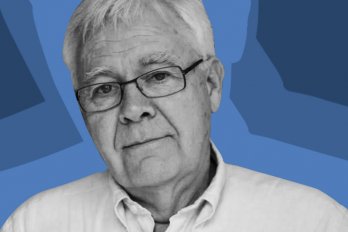When I was four years old, my family’s neighbourhood in Beirut turned into a battleground between the Palestinian Liberation Organization and the Israeli military, and so we left Lebanon. It was 1982, and the country had already experienced seven years of civil war; there was nowhere for us to go but the sea. We slept atop a crowded ferry deck in two fold-out beach chairs, our suitcases leaning against us, as we made our way to Greece.
Listen to an audio version of this story
For more audio from The Walrus, subscribe to AMI-audio podcasts on iTunes.
During our first months in Athens, I spent my mornings standing out on the balcony of our apartment, studying the busy street below. As lunch approached and the days grew hot, the stores closed one by one. The shopkeepers stopped shouting at beggars and locked their doors, disappearing into the dark recesses of their living quarters. While everyone else slept through the sun-baked afternoons, I watched cartoon animals speak in Greek overdubs I could not understand.
I did a lot of staying quiet in those days. We still carried with us a stench of war. My parents instructed me to not open my mouth in public, to try to blend in as much as possible. My father had hastily arranged for us to sit out the siege of Beirut by securing work at his advertising agency’s small Greek office, but we didn’t know how long the company would allow us to stay. We had brought only our clothes and some photo albums with us. Everything else had been left behind.
In the long Athenian dusk, the city’s streets became busy again when shopkeepers and residents took advantage of the cooler air. One evening, to lighten our moods, my father decided to take us to a night market, where locals would gather to socialize and stroll after slow days at work.
I’d never travelled beyond the small supermarket two streets away. After crossing a main road, we entered a new neighbourhood with less garbage lining the sidewalks and no graffiti in sight. I remember climbing stone stairs and passing through narrow, crowded alleys that gave way to walls covered in baskets and purses, where bins overflowed with nuts and fruit. In a butcher’s window, a ladder of ribs dangled from a chain. The savoury aroma of grilled meat wafted through the air as men shouted prices at passersby, bread in hand, ready to assemble sandwiches. I followed my parents, unable to see where I was going through the waists of all the people around us. As the crowd thickened, I remember hearing a low growl, a sound that couldn’t have come from any of the humans at the market.
We turned onto a packed plaza. High above the swell of curious onlookers, a giant brown bear was standing on its hind legs. Its hair was matted, its eyes gazing blankly over our heads, a muzzle covering its mouth. A leash hanging from its neck led into the hand of a man making announcements in Greek into a megaphone.
We moved toward the spectacle. I’d never stood so close to such an immense animal. The man holding the leash appeared to have the bear fully in his control. He tugged and the animal turned his way. When he held up his hand, the bear sprang onto its hind legs. When he asked questions into the megaphone, the bear crouched or let out a whimper that sounded like an answer to its captor’s words. The creature was trying to talk, I marvelled. A ripple of laughter rose from the crowd. I laughed too.
Our lives had been so difficult for as long as I could remember. For months before we boarded that ferry, my school had been closed and I had rarely left our home. On a night like this in Beirut, we would have been sleeping underground, in constant fear of another explosion. Now, the strange sight of a bear mimicking human actions was a balm, a source of wonder and amusement for a child who hadn’t laughed in a long time. Yet, at the same time, there was something so sad about the way the animal stood there, different from everyone, hovering over us in defeat.
On the asphalt in front of the bear lay a cassette deck, which I only noticed once the man set down his megaphone and bent over to press play. He untied a whip from his belt as pop music filled the plaza. At the man’s beckoning, the crowd began to clap in unison. He cracked the whip at the bear’s feet, and the bear leapt onto its hind legs with a yelp and began hopping from one foot to the other.
That night, whenever I closed my eyes, the bear was there, standing awkwardly on its back legs, wanting to set its paws down but afraid of the consequences. Its eyes magnified before me, and they were filled with immense sadness. I felt that way too. Like the bear, I’d danced my way along the edges of a world that had no interest in my well-being. How had this brown bear ended up in a city with garbage in its streets, in a world that was too hot and dry? How far had it been made to travel? Had it, like me, been tricked into moving overnight, cajoled out of its bed, made to run barefoot in the dark, and smuggled onto a boat?
When I finally fell asleep, my dreams returned to the night market. Now I was the bear, standing in the middle for all to see, the reluctant attraction. I felt a muzzle around my mouth, its leather straps and silver buckles digging into my fur. The muzzle made a show of shutting me up in front of all the people who didn’t look or sound like me. My parents had warned me: the locals don’t like brown boys barking in Arabic in their supermarket aisles or along their sidewalks. They already thought there were too many of us here because of our wars. In my dream, I had committed the crime of speaking too loudly in my own language. I gulped at what air I could get through the muzzle, certain that, at any moment, a whip would snap and I would be made to hop. My feet twitched in bed.
I remember waking up in my mother’s arms. “It doesn’t want to dance!” I cried.
“Of course it wants to dance,” she said. “It’s very good at what it does. It has a talent.” I felt better, but I knew it was more a reaction to my mother’s warmth than to her words.
The next morning, my father sat down at the kitchen table as I ate breakfast. “I hear you’re worried for the bear,” he said.
I nodded sadly, perplexed at how a bad dream could garner the attentions of both my parents.
“You feel bad for it.”
I nodded again.
“When you grow up,” he said, “don’t forget that feeling.”
We were able to stay in Athens after that summer, and we lived there for seven more years. I studied at an American international school, where I learned English and met other kids from all over the world, many of whose parents worked for the US embassy or on the military bases that fed the flow of troops into the Middle East. But there were quite a few others like me, Arab kids whose families were on the move because of conflicts at home. That school was where, in the second grade, while playing soccer with a crushed pop can, I remember first being put on the “dark team” in a game of “darks” versus “lights.”
At first, I was proud to be on the dark team. We won as many games as we lost, and we were all the same. Then, one day, after tripping over another soccer player, I was pushed into a fence and told to fuck off back to my own country where everyone else was the same colour of shit as me. After that, I always knew when to push myself into a fence before anyone else could. I learned to hang around the edges, circling only in the outer orbits of friendships, developing hobbies meant for one.
I was ten the first time I was ever called a nigger. The boy who used the word was a close friend of mine. I knew he meant it as a whip he could snap. But I didn’t want him to see how to get to me. Then he’d know how to get me every time. So I danced around his insult and told him he had it wrong, that he was thinking of the wrong brown, that he was a moron for not being able to tell browns apart, and he laughed because I was trying so hard to make it sound like we were just joking around. “But you’re still a nigger,” he said.
I learned years later that kids acquire the language they use from their homes. My friend was part of a Cub Scouts group that his dad and several others from my school helped organize. The group doubled as a social club for the American kids to learn the values of life they were missing back home. I joined because I wanted to learn to tie knots and make s’mores. I was always envious of how my friend looked up to his father; I looked up to him too. His dad was in the navy and was very popular with the other military dads, with whom he would drink beer and tell provocative jokes.
The Scouts went on camping trips, which my own dad only begrudgingly attended because an adult had to accompany me. My dad embarrassed me. Scouts didn’t interest him. He didn’t speak English well or tell the kinds of jokes the other fathers did. He was often the first to leave the fire at night, bowing out of the drinking sessions the other fathers enjoyed after all the kids went to sleep.
I remember my friend’s father taking me aside one day to tell me I had disrespected the Pledge of Allegiance. The pledge was one of the first things we learned as Scouts, and American or not, we had to recite it. I knew it by heart. I remember him telling me I hadn’t stood straight enough while mouthing the words, that I kept looking around, that my voice didn’t have enough conviction, that I needed to whip myself into shape, that the flag meant something to him and others, and that I wasn’t trying hard enough.
So I tried harder. I threw myself into every race and worked intensely toward every badge. I energetically pledged allegiance to someone else’s flag at every event after that, but I was never quite able to enjoy Cub Scouts the same way again, and at the end of that year, I quit.
We never returned to Lebanon. Almost four decades have passed, and I now live in Montreal with my own family. I still think about the bear. I remember how it danced and what it made me feel. Every time I step out of the shower and look at my reflection, blurred by the steam on the bathroom mirror, in stark contrast to the white tiles behind me, I think of the bear, and for a moment, my skin looks like fur.
A few years ago, as I sat with my eight-year-old son at our kitchen table, he told me that two of his friends had called him un nègre. He attends a French school, where he always feels a little on the outside because he identifies more with English, the language we speak at home and the one in which I first learned to be on the outside too. The slur suddenly reminded me of people I hadn’t thought of or spoken to since elementary school.
But it doesn’t appear to have bothered my son much. Like me at that age, he doesn’t understand that the true value of a word comes from its accumulated usage, its baggage, not simply its utterance.
I thought back to how I’d tried to defend myself in Greece by telling my friend that he was mixing up his browns. I decided that wasn’t the defence I wanted to pass along to my son. I wanted to tell him, as he ate the grilled cheese sandwich I’d made him, that trying to deflect hate on a technicality is a useless exercise, that some language doesn’t exist to distinguish, that inaccuracy is part of its insult.
I guess I’m writing this because my father was right: I haven’t forgotten any of those feelings. But I still don’t know what to do with them. I don’t want my son to dance like I did. I don’t know how to tell an eight-year-old that moments like these will only accumulate over the years, leaving small but ever-present chips in his personality that will one day carve out a hollow of distrust. I want to tell him that it’s so easy to dehumanize a person this way. I want to tell him that a schoolyard insult will one day have greater meaning when it links up with some other person’s words, or a sideways glance, or a step back, and together they’ll form a tapestry of evidence against all sorts of people and what they believe about him. I want to tell him to guard against the kind of paranoia this breeds. I want him to know that paranoia can be a cage that we back ourselves into, after the dance is over, when we’re left to ruminate on the performance.
I have all this to say, but I won’t because I once again feel muzzled. I can feel the silence chafing against my face even as my eyes gesticulate wildly, dancing to a rhythm only I can hear. My son doesn’t notice anything amiss. After he takes the last bite of his sandwich, he wanders down the hall to watch TV.





